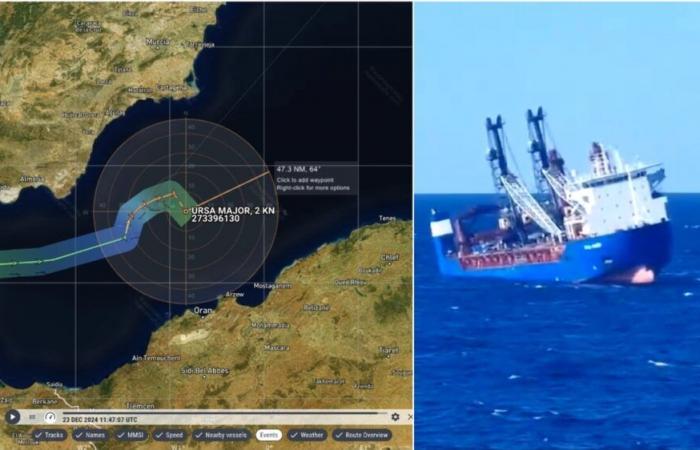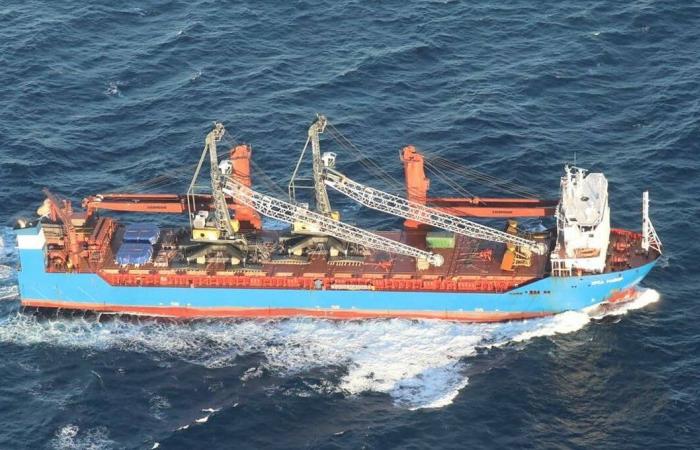A Russian cargo ship, the Ursa Major, sank on the evening of December 23rd off the coast of Spain, between Águilas (Murcia) and Oran (Algeria). Having entered the Mediterranean from the Strait of Gibraltar, it appeared adrift since yesterday morning and was evacuated after the shipwreck. Fourteen crew members were rescued and transferred to the port of Cartagena, while two crew members were missing, the Russian Foreign Ministry said.
Russian ship Ursa Major sinks in the Mediterranean. The explosion, then drifting in front of Spain: 2 missing. «It was headed to Syria to evacuate the bases»
The route (towards Syria) and the relief efforts
Several ships operating in the same area participated in the rescue work and subsequently the Maritime Rescue specialists, the Clara Campoamor ship and the Navy patrol boat Serviola joined.
The ship, flying the Russian flag, left St. Petersburg 12 days ago and was officially headed to the port of Vladivostok, where it should have arrived on January 22nd. In reality, according to several military and intelligence analysts, the ship was headed to Syria as part of a convoy of Russian naval units tasked with transporting equipment and personnel to Russia, while the withdrawal of Russian forces from the Middle Eastern country is underway. According to many sources, in fact, the Ursa Major would be an arms smuggling ship for Moscow, built in 2019.
The two cranes on board
Flagship of the Oboronlogistics fleet, the Ursa Major, which according to what was announced had left for the port of Vladivostok, was carrying two port cranes of 380 tons each, necessary for the expansion of the terminal, and 45-ton hatch covers for the new icebreakers . The harbor cranes were loaded onto the ship using two of the ship's cranes. The lifting capacity of each crane on the ship is 350 tons, for this reason they had to work in tandem (together they lift a load of up to 600 tons). To ensure the stability of the cargo during loading operations, the containers were pre-loaded on the lower deck as additional ballast. The complex loading operation was carried out entirely by the ship's crew.
The investigations
The Russian embassy in Madrid is in constant contact with the Spanish authorities regarding the shipwreck. The diplomatic mission itself reported this to TASS. “The embassy is investigating the circumstances surrounding the sinking of the Russian cargo ship Ursa Major 110 kilometers off the Spanish coast in neutral waters,” the diplomatic mission said in a statement. “We are maintaining constant contact with the Spanish authorities on this matter and keeping the situation under control,” the embassy added. “We stand ready to provide any necessary assistance to crew members if necessary,” the statement concluded.
The shadow of Kiev's 007
The exact circumstances that led to the sinking remain unclear, but reports suggest that an explosion in the engine room that blocked the ship's engines caused the sinking, causing it to drift and take on water. As reported by Itamilradar, a Russian Navy ship from the same convoy headed to Tartus, Moscow's base in Syria, asked to take control of the rescue operations, citing the UNCLOS framework (United Nations Convention on the Law of the Sea). Control of the rescue efforts was later transferred to the Russian naval vessel. Although the cause of the explosion is still unknown, speculation has inevitably turned to the Ukrainian secret service, which was the first to report the difficulties encountered by the Russian ship via Twitter. Furthermore, in recent days an unknown drone (attributable to Kiev?) managed to fly unhindered over the Khmeimim air base in Syria, where Russian troops are still stationed. In the film it was possible to count the presence of around seven Su-24M bombers, four or five Su-35 or Su-30 aircraft, around three Mi-8s and two Ka-52s and Mi-24/35s each, up to 18 in total aircraft.
The mission
According to some sources, the vessel would be part of a convoy of Russian ships leaving from the Baltic Sea and most likely headed towards the port of Tartus, Syria. The mission, according to analysts expert in maritime movements, consisted of loading military equipment to be brought back to Russia after the withdrawal from the region decided following the fall of Assad. The ship's captain said it was carrying empty containers at the time of the accident. Last December 19, Putin himself spoke about the situation of the Russian bases in Syria. The Kremlin head had said he did not yet know whether Russia would maintain its military bases in Syria, because this would depend on relations with the new authorities. «I don't know – Putin replied to a question about it during the end-of-year press conference -. We need to think about it, because we need to see how our relations will develop with those political forces that now control and will control the situation in this country in the future. Our interests must coincide.” Putin added that Moscow maintains relations “with all groups that control the situation there and with all countries in the region.” “The vast majority of them – he added – tell us that they would be interested in our military bases remaining in Syria”. The Russian president added that Moscow had proposed for now to use the Khmeimim air base to convey humanitarian aid to Syria “and this has been accepted”. The same could be done with the Tartus naval base.
The track of freighter URSA MAJOR, destined for evacuation of Russian forces from Syria, indicates she is drifting without propulsion towards Algeria. Wind has shifted though in a more favorable direction. Guess: captain and shore support are a bit worried re. consequences of accepting salvage.
[image or embed]
— auonsson (@auonsson.bsky.social) 23 dicembre 2024 alle ore 23:32
The weapons and bases in Libya
On the same day, news emerged that Russia had transferred to eastern Libya the air defense systems it had deployed in various areas of Syria in support of its ally Bashar Assad. This was made known by a former Assad official to the German news agency “Dpa”, confirming what was also partly anticipated by the Wall Street Journal and the Observatory for Human Rights in Syria. Analysts from the German Ministry of Defense quoted by the German agency speak of the possibility that Russia will obtain privileged access to the Libyan port of Tobruk to transfer military components there, thanks to the support of Khalifa Haftar. According to the Dpa source, wagons were also taken to Libya. According to the sources, Russian cargoes have transferred the equipment, including radars for the interceptor systems of the S-300 and S-400 missiles, from the bases in Syria – used by Russia as a hub to bring the mercenaries of the former Wagner and the weapons destined for the countries where they have extended their political and military influence – to the bases in Cyrenaica under the control of Khalifa Haftar. Having remained 'discovered' in Syria, where it had installed the naval base in Tartous and the air base in Hmeimim, Moscow turned to its old ally, which in recent years had already hosted hundreds of Wagner men in Jufra, to be used in the conflict against Tripoli.







